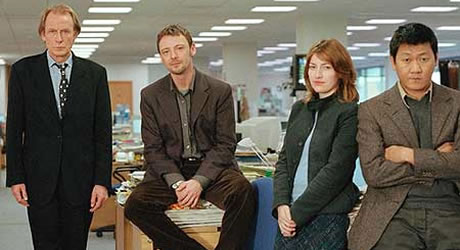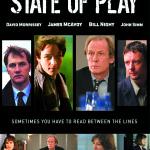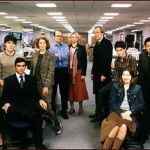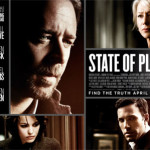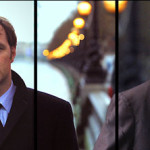“Sometimes you have to read between the lines”
So it says on the DVD case of State of Play, the TV series. How true is that?
This is a blog explaining why the original 2003 TV series State of Play is one of the most compelling series in living memory, where State of Play, the movie remake, is forgettable and not worth two hours of your valuable time. Or it would be if I could be bothered to look out and watch the movie version, though I watch the TV version on DVD at regular intervals.
The nub of it is this: the movie is a star vehicle for rugged Kiwi Russell Crowe and a host of stars, all of whom seem to be phoning in their performances, transplanted from the UK to Washington DC. The original consists of, in the words of the Guardian, quoted on the DVD box:
“…great performances, taut direction, brilliant script – State of Play deserves to take every award going…It’s bloody magic. The story is gripping, the acting is ace and Paul Abbott’s script is outstanding. His ear for dialogue, and for different voices, is exceptional. The exposition is swift, nifty and joyously unclunky. The characters are credible and rounded. If you can count the best dramas of recent years on the fingers of both hands, it’s time to grow a new finger.”
I heartily concur. It lost everything in translation, starting with a brilliant cast of hungry actors who give every appearance of being as keen as the audience to find the core of the conspiracy at the heart of this story. This truly is a voyage of discovery for a team of journalists investigating the root causes of the death of the mistress and researcher for a prominent politician, and a young black teenager with whom she was in contact.
It is this urgency and sense of purpose that sets the original apart and makes it gripping drama from start to finish, and arguably the drama that best explores the murky heart of the uneasy relationship between politics, journalism, police and lobbyists. Indeed, it is welcome to see the name of the wonderful journalist (especially sketch-writer), broadcaster and author Simon Hoggart as political advisor to the series, a sure sign that the story portrayed bears the hallmark of authenticity and accuracy.
But all is not as it seems: there are twists and turns in the plot line, raw ends to human emotions, dead ends and revelations throughout. There is a forensic quality to Paul Abbott‘s story and script. Layers of myth, half-truth and lies need to be peeled away by the journos to get to the heart of the stinking heart of the political scandal. The parties are keen to avoid scandals being made public, and the newspaper proprietor is keen to avoid his friends being publicly humiliated, but there are other sinister forces at play, people in it for their own motives. And even when you thing you’ve got to the heart of the mystery, there is more to come…
Abbott’s script rings true from the first moment to the very final denouement, something you certainly can’t say of Hollywood’s glitteringly artificial take on the story. Perhaps this is a reflection that this story is true to its terroir, and that it works as a British story far better than transplanted to the USA?
Secondly, a 2-hour movie cannot compete effectively with a serial spaced over 6 hours, since the latter allows for the complexity of the characters to be developed more effectively, especially since, without giving away any spoilers, characterisation is key to the storyline here. They need space and depth in order to be better understood and gain credibility, whereas in the movie they come over as flimsy cardboard cutouts rather than real people – or at least more one-dimensional.
Why does it come out such an unequal contest? Point of the matter is that David Yates (he who later directed four of the Harry Potter movies) provided a more beguiling and coherent sense of narrative in the serial than Kevin Macdonald (who went on to direct the excellent Last King of Scotland) in the movie. Yates won the Directors Guild of Great Britain Award for Outstanding Directorial Achievement for State of Play, a measure of a truly top notch performance, one that leaves its mark on the audience.
Let’s take a few prominent examples, starting with John Simm‘s Cal McCaffrey. Simm could easily be a talented but run-down journalist. His chaotic lifestyle seems authentic, and his nose for a story on the nail, where in Crowe’s case it appears painted on by the yard. Simm lives and breathes his role; he does not act McCaffrey so much as inhabit his skin. You could easily imagine him doing this for a living – but then you could say that about the whole team, including Della (Kelly Macdonald, no relation to Kevin), Dan (son of the editor played by James McAvoy), Helen (Amelia Bullmore) and Pete (Benedict Wong.) Together they function like a tight-knit team rather a host of disparate individuals thrown together in rehearsals, which as any director will tell you is much easier said than done.
Cal’s double-edged relationship with aspiring politician Stephen Collins (David Morrissey) also rings true, since to politicos journalists are man things: a source of information, a way to place leaks, but also a dangerous enemy if hostile stories are posted. This “edge” is readily apparently throughout, not least when Cal starts an affair with Collins’s estranged wife Anne (Polly Walker.) Emotions are always ambivalent, though in most dramas they are painted very black and white. Not here.
Bill Nighy, distinguished British character actor in his own right, plays Cameron Foster, editor of the fictional Herald newspaper, by turns smooth, suave, sharp and sardonic, also a dead spit for Alan Rusbridger of Guardian fame. His counterpart in the movie is Cameron Lynne, played by another distinguished British character actor, Helen Mirren. Where Mirren seems to be set on a mission to be ruthless, Nighy brings light and shade to his pursuit of evidence to back up the investigations by his hacks into a series of murders linked to Collins.
Look also for Philip Glenister, he of Life on Mars fame and here doing a tougher version of his Gene Hunt persona, minus sense of humour. And indeed for Marc Warren as the slimy PR Dominic Foy. Everywhere you look there is an embarrassment of riches, actors going above and beyond the call of duty to deliver a convincing performance.
Helped by the jerky hand-held camera, this is probably as close to reality as you can get in any fictional tale of political intrigue. In short, the TV series is the standard by which TV political thrillers should be judged, and attempting to remake it in Hollywood was always going to be a failing venture when the mark was set so high. If you have not already watched the original, please do so before, or rather instead of the movie. Thank you!

